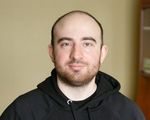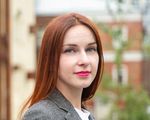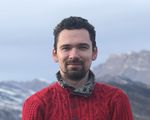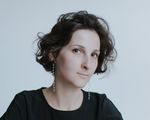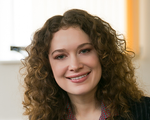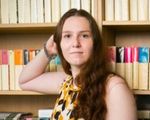About Success Builder
How do you find your place in life? How do you find something to do that both comes naturally to you and makes you happy? The answer is that you have to apply the knowledge you’ve gained from university and from life itself correctly. The Success Builder Project features HSE University graduates who have discovered themselves through an interesting business or an unexpected profession. The protagonists share their experiences and lessons learnt and talk about how they’ve made the most of the opportunities they were given.
A graduate of the WEIA faculty at HSE University, in 2018 Marina Demidova opened the DocDeti children’s clinic providing treatment and diagnostics using scientific, evidence-based healthcare. It has now grown into a chain of Moscow clinics. In this interview with Success Builder, Ms Demidova explained the ins and outs of private healthcare, the causes of physician burnout and ways to deal with the stress of being an entrepreneur.
After graduating from high school, how did you choose your future profession?
I got excellent grades in school and graduated with honours. I sat in the front row and drew pictures on the last page of my notebooks during all my lessons. This is why my homeroom teacher was so surprised when I decided to study economics. ‘You’re such a creative person’, she said. ‘You’ll get bored working with numbers’. But I had a strong hunch that later proved true: it is in business that you can fully express your creative abilities. What’s more, I really love math, and economics was the perfect way to develop two of my greatest strengths.
I was impressed by HSE University from the very first Open House I attended. And HSE University offered preparatory courses starting in the 10th grade, so I enrolled at once. I fell in love with HSE then and never even considered going anywhere else. I still remember how my first math class moved me to tears.
I was a straight-A student in high school and was sure I knew everything, but here it turned out that everyone around me was smarter
I had to work hard to reach the level required for admission to HSE University. I decided to study World Economy but didn’t win a full scholarship. At that time, they were experimenting with the Unified State Exam in the regions, and there were 104 applicants for every scholarship slot available. I came up a couple of points short and so my parents had to pay for my first semester. But within a few months, I took first place in the student ranking, was awarded a scholarship and the HSE Accounting Department returned the money that my parents had paid for my education. It was an amazing occurrence, but things that are even more incredible can happen at HSE University.
What made HSE University special for you?
Attending HSE University was one of the most significant events of my life, along with meeting my partner, having children and starting a business that I love. While studying at HSE, I experienced the ideal state of competition and fairness. There was an understanding that people here get a return on what they know, what they can do, on how much effort they put into the learning process. I felt very comfortable in this environment. Fairness is one of the most important values for me, and this is consonant with the values of my university.
HSE University fueled my desire to continue creating competitive, first-rate and fair conditions for those around me. Everyone says that your student years are full of parties and escapades, but it wasn’t anything like that for me. I studied all the time. Looking back now as the director of a medical clinic and mother of two, I realise that I could have indulged in a little youthful rebelliousness, which can be good sometimes.
My eldest child is now in the third grade. He got all A’s and only two B’s, so I told him, ‘Darling, bring home at least one C so that Mama can relax’. It’s overkill to try to be the best at everything. Although, this might have been just what I needed as a university student. It was a serious lesson that I had to learn: you get back only what you put into something, and not more. It turned out to be an excellent ‘school of achievement’ that taught me the discipline I needed for the rest of my life.
As someone specialising in international studies, have you thought about applying your skills along those lines?
I always imagined that I would work in international business and my parents pointed me in that direction from the very start. They are both state employees and they really wanted me to work in a large international company. As a ‘good daughter’, I could not help but share their dream. At HSE University, I managed to try my hand at science, serving for two years as a project coordinator at the Center for Comprehensive European and International Studies under the direction of Timofey Bordachev. I wrote my thesis on European integration with him.
Still, I understood that science was not for me and I had a desire to work in business. It’s important for me to see tangible results from my work, and not in the form of a published pamphlet or from winning a science competition. I now have a shelf in my office that holds all of my scientific work and books in which my articles have been published, along with research conducted by other HSE grads. It’s great that I’ve had this experience with science, but I chose a different path.
Seeing my work in a book on the shelf isn’t enough for me; I want to bring tangible benefits to the world
After graduating from university, I went to work at Samsung Electronics under the Fresh Graduates programme for graduates who did well academically. I asked to work in the marketing department because the creative part of my brain needed expression. I spent three years at Samsung Electronics, and then worked as a product manager for printers at Xerox. Working in business, I finally felt what it means to ‘do applied things’.
Then I became a mother and the break from work gave me a chance to try my hand as an entrepreneur. I developed small projects from scratch, did marketing with a minimal budget and created websites myself using DYI tools. It was great seeing how something of value to people could appear out of nothing. After this experience, I didn’t go back to international companies because I had experienced how interesting it is to build up processes from scratch, influence every stage of the project, and to control and be responsible for it.
How did you wind up in the medical field?
The projects I was involved in gradually grew in both number and scale. An entrepreneur friend had an expert centre and, while I helped him build up his marketing, I just happened to discover that there was a demand for genetic research. Startups in this field immediately boomed with minimal investment in development. I began organising processes, found a good genetics lab, immersed myself in medical science and opened the door to a new and very interesting part of my life. I had no idea there was so much demand for genetic expertise in Russia. We quickly became the genetic lab’s largest partner in Moscow and I fell in love with genetics.
This was a new field of science for you. How did you master it?
I never stopped asking questions of the laboratory head; I was interested in every aspect of genetics. What’s more, I had to be able to respond in detail to customers’ questions. With 99.99% certainty, I could explain the loci, alleles and numbers on the test results form. I was good at it, and this inspired me even more. In the end, the director of the lab proposed that I open a Moscow branch and become its head. In addition, I had the chance to participate in the launch of non-invasive prenatal tests for pregnant women, pre-implantation diagnostics of embryos in IVF and many other interesting projects.
In time, I became the executive director of the lab and travelled up to three times a week from Moscow to the head office in Tver. I spent seven hours a day on the commute, but I loved it! I realised that we were qualitatively changing people’s lives by launching our products and I was on fire with my job. For example, non-invasive prenatal tests actually save lives.
What makes this method unique and important?
Biochemical pregnancy screenings are performed for all pregnant women. These are purely probabilistic indicators: someone once calculated the correlation of biochemical indicators, taking into account the risk that a child will be born with genetic pathologies. You could just flip a coin and achieve almost the same accuracy. Then the woman receives the result of this screening indicating, for example, a heightened risk of genetic pathologies in the child. First, the assumption that the child might be sick causes severe stress for the expectant mother. Second, such results oblige the doctor to send her for invasive testing, which means you need to pierce the stomach and take the biopsy directly from the placenta. This is a relatively safe procedure, but there is still a small risk of losing the child.
We directly test the child’s DNA, which enters the mother’s blood, thereby not putting either the mother or the fetus at risk – and the tests are more than 99% accurate. I was fortunate enough not only to launch these tests throughout the country, but also to participate in organising the transfer of the technology for non-invasive prenatal tests from Germany to Russia.
Throughout all this, I understood that I remained a hired hand. I still wanted to do my own thing, and specifically in medicine. This idea stayed with me from the moment I gave birth to my first child. I prepared for it as you would for a difficult exam; I studied the literature, read foreign studies and dove into the work of the American Academy of Pediatrics.
It turned out that international guidelines and research don’t tally with reality at all
I was surprised when I saw that, for example, different doctors have different ways of handling the naval of a newborn and give conflicting recommendations on nutrition or how to treat basic ARVI. This is strange because many fields have some standards of what is right, but why doesn’t the medical field? I started digging deeper into this question and spoke with doctors, but there was no consensus. I was told that if two out of three doctors agree on something, this is the correct answer. It seemed horribly illogical and contradicted the principles of critical thinking that I learned at HSE. The answer to my questions was evidence-based medicine.
In the 1970s, physicians in the U.S. and Europe began realising that one-half of the treatments they were prescribing had no proven efficacy and decided to agree on a unified approach to evaluating treatment efficacy.
Is this the evidence-based approach? What constitutes the evidence?
The main criterion of the evidence is the conducting of randomised controlled double-blind studies. They take two groups of people: one receives a placebo and the other receives treatment. Neither the doctor nor the patient know to which group the patient belongs, and the composition of each group is random. An impartial study of the results is made that confirms or denies the efficacy of the drug. As someone who has a brain for math, this logical approach really inspired me. I asked: Why don’t they do this in Russia? Why do they continue putting their faith exclusively in the opinion of doctors?
This gave birth to the project of having my own clinic where I could employ the evidence-based method of medical practice that is based not only on the clinical judgment of the doctor and the assessment of the individual characteristics of the patient, but also on the latest scientific evidence of the treatment’s effectiveness. My business partners and I presented the idea to investors and received a starting budget. It was fortunate that they believed in our idea because, at that time, the medical business worked according to completely different rules and most of my acquaintances in the medical field said that it wouldn’t work.
We started the project in 2017 and opened the first clinic on December 3, 2018. My youngest son was born the same year.
What is unique about the medical business?
I had friends at that time with experience in setting up clinics: they became my business partners and helped me a lot. It’s true that the medical business is unusual. It’s unlike anything else because it involves the clash of medical and business interests. If someone sells pies, then the more they sell, the better it is for both the seller and buyer. But when we sell medicine, we can’t employ standard marketing and up-selling/cross-selling strategies. In medicine, the more we sell to the patient – that is, the more tests we run and the more unpleasant procedures we perform – the worse it can be for him as a result. We should perform only as many medical manipulations as a person needs – no more and no less. This is ethical and humane.
Unfortunately, the medical business does not always follow these principles, simply because it operates according to the standard laws of business and marketing: the more you sell the better. Our experience shows that in the long term, focusing on the results of treatment and the benefit for the patient leads to the greatest profits. When you put the patient’s interests first, they trust you, stay with you forever and bring their friends. I took a risk in implementing this approach and it turned out to be the right one.
If the evidence-based method is so effective, why isn’t it used on a national scale?
Unfortunately, the traditional education for Russian doctors is focused on the experience of their professors, few of whom read international guidelines or actively study the results of the latest research. These can be found on the portal UpToDate, which is a sort of Google for those in medicine. There is a rather high fee for access and all of the information is in English.
The doctors who currently work in evidence-based medicine are restless people – in a good sense – who themselves want to search and to learn English in order to read source materials
But there aren’t many such enthusiasts, and this hinders the development of evidence-based medicine in our country. Only a few clinics use modern medicine, but the approach is gaining in popularity. It’s great that people are learning more and more about this field. As the head of our organisation, I was recently called in to the tax office. I was expecting them to ask me serious questions, but the tax inspector said, ‘Everyone who has children knows about DocDeti. You can go’. I thought, ‘Wow – even the tax inspector knows us. That means we must be doing something useful’.
How did you gather like-minded people for your team?
I spent a long time searching for employees, people who want to develop this new and important field – and I found them. It’s an incredible pleasure to work with these people. It’s a joy communicating with them every day, overcoming problems and finding solutions. For example, the start of the coronavirus epidemic was a big challenge. We also closed our doors temporarily, like many businesses did, even though we were in the middle of building and opening two more clinics. The investment was already in place, but a terrible uncertainty arose as to how the project would develop further. The team provided tremendous support at that moment. We started generating ideas at such a rate that, had it been two months earlier, our business would have tripled.
It’s great interacting with my co-workers. They have a enormous desire to do something good in life and for the country, to take medicine to a fundamentally new level. It’s not a mutual admiration society, of course. We argue, prove our points of view, look for compromises and think about how to organise everything properly. But it is always a pleasure because everyone sincerely believes in the common mission.
How did you deal with the stress of being an entrepreneur?
When you start your own business, you worry constantly and experience fear, but this is normal. Fear is a natural protective function of our body. Being an entrepreneur is difficult and nerve-racking and carries a lot of responsibility. Our brain, knowing this, seems to turn on an alarm and screams, ‘Don’t go there!’ But it is also passion, drive and the desire to do better. You are constantly competing against whom you were yesterday: can I make my business more convenient, effective and advantageous for the client? Once you’ve tasted it, you can’t stop. There are special practices for working with stress, including psychotherapy, which shouldn’t be dismissed. But there is no entrepreneurship without stress and the constant search for a work–life balance. You just have to accept this.
An employee always has the option of changing jobs, but a business owner does not. He must carry the project forward no matter what. The business might take off like a bullet train or get stuck on a siding and have to be pulled free. On the other hand, when you sincerely believe in your mission, the motivation to get the business back on track is very strong.
How did the market react when your business appeared?
I had good experience in marketing, so I managed to get the word out about our project quite well before the launch. In the beginning, other clinics that were moving towards evidence-based medicine were jealous of us. I find such resentment from others very difficult to take. It’s rough when people claim that you’ve lured doctors away or are using other people’s ideas in your work. Now everything is smoother: we established friendly relations with our colleagues and everyone realises that no one is poaching doctors and patients from others.
In fact, doctors in many clinics are now incredibly exhausted by the burden of administrative and bureaucratic work. Physician burnout is a huge problem, and patients encounter this when they call an ambulance or check into a hospital emergency room. It’s not that the doctors are bad, but that their employers didn’t support them adequately.
I worked in a major international business and saw how they treat their employees, how the company gives them fresh rolls to have with their coffee every morning, and how they build offices for them that are better than what they have at home. I understand how to treat employees, and especially doctors, who must be fresh and able to think about the patient’s welfare.
Why do doctors suffer from burnout?
We recently recorded a podcast about physician burnout in which we constructed a mini-Maslow’s pyramid for medicine. For a doctor to bring real benefit to the patient, he needs to be taken care of well. He must be able to feed and house his children. At the next level of the pyramid is the doctor’s environment, and this should support him so that he doesn’t worry that someone will ask why he didn’t generate a certain minimum amount of income for the clinic.
And the most important level is personal development, understanding that you are doing something good for the patient and that the patient will be grateful to you for this. This highest level can’t be attained without first reaching the previous ones.
A doctor can endure bad treatment and low pay, but will burn out after a few years
This is simple physiology. The doctor’s brain is telling him that he must conserve resources, that he’s not getting any return on his effort, and so why should he even try? For this reason, it was important for me to create conditions for doctors in which they would enjoy their work, be enthusiastic about patients and their health, and be a resource for patient care.
Are you popularising evidence-based medicine? How does the media respond to it?
When I was preparing to open the first clinic, I started translating articles from the American Academy of Pediatrics and using this information in social networks. It was scary when people asked questions in the comments section and it took a long time to search for answers. Then we hired a head doctor for the clinic who took on an expert role and began to help with the content. In the beginning, I did PR myself. I contacted various publications and pitched topics and rough drafts for articles. We now have a large marketing department. We work constantly with the media. Online publications received us well and quickly. We began offering them unique content by our doctors that we reworked into material that was readable and that anyone could understand.
We collaborate a lot with bloggers, especially on the topic of motherhood, and almost never pay to have our articles posted. We understand that good medicine and quality information are valuable in themselves. We are currently collaborating with pediatrician Fyodor Katasonov and the Libo/Libo studio to make the latest season of the podcast ‘Why we’re still alive.’ We really enjoy popularising evidence-based medicine. I personally like making creative, high quality, attractive content.
We also created our own DocMed podcast, but it’s more for the medical community than for the general public. It deals with issues that are of interest to doctors. For example, in a recent episode, we spoke with two excellent doctors, proctologist Roman Sorkin and gynecologist Ekaterina Antonova. We discussed the topic of ‘indecent’ doctors with them and asked how they conduct office visits so that patients don’t feel awkward or embarrassed.
It turned out that, among other things, they use humour with their patients to calm their apprehensions beforehand. We’ve had episodes on state and private medicine, on how to treat yourself, how to receive treatment from a fellow doctor, etc. I enjoy uniting and supporting the medical community in this way and creating a healthy atmosphere of mutual personal and expert support.










